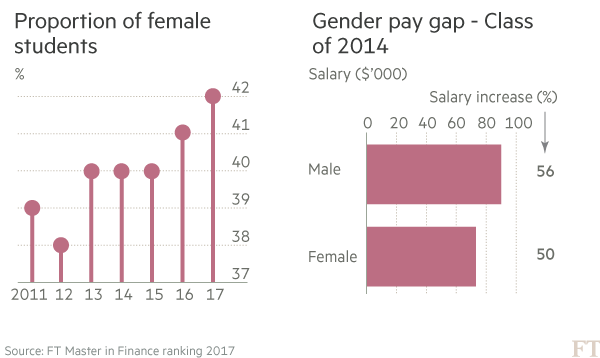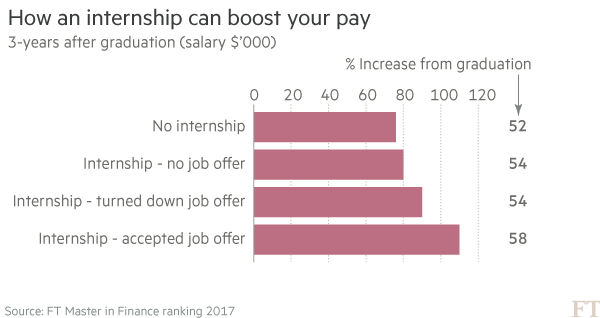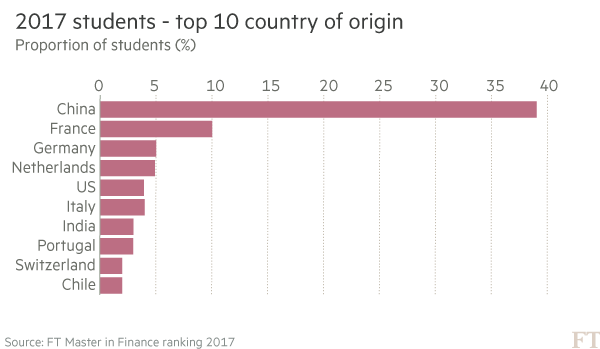More women join financial industry but salaries are not equal

Roula Khalaf, Editor of the FT, selects her favourite stories in this weekly newsletter.
Gender diversity is increasing among graduates working in the financial industry, according to data collected for the 2017 edition of the Financial Times ranking of masters in finance programmes.
The proportion of enrolled female students has increased steadily since the ranking began six years ago to 42 per cent among the most recent cohorts. This is low compared with the 48 per cent of female students on masters in management courses but compares favourably with the 35 per cent in MBA programmes.
The 2017 rankings feature the top 60 pre-experience courses for students with little or no background in the industry and the top six post-experience programmes for professionals already working in the sector.
Only a handful of schools offer post-experience courses.
The 12 US schools that appear in this ranking are the most gender balanced on average, with cohorts that are 48 per cent female.
There is a salary gap of nearly 22 per cent between male and female graduates three years after they finished their courses, $90,000 compared to $73,000. That gap had been 17 per cent when students first graduated, so this difference has widened over time.

One explanation could be that significantly more men than women work in the industry’s best-paying fields. A third of men work in private equity or venture capital, investment banking or mergers and acquisitions, and hedge funds compared with only 19 per cent of women.
The research also suggests there maybe a value in finding a job through an internship. Interns who accepted a job offer had higher salaries than those who had received an offer but refused it. Those interns who did not receive an offer had lower salaries still. The gap between these groups had increased three years after graduation.

French business schools top the 2017 ranking. Edhec Business School, based in Lille and Nice, leads the field for the first time. HEC Paris, which dominated this ranking since its first edition in 2011, drops to second place.
Besides Edhec and HEC, Essec Business School, ESCP Europe and Skema Business School are in third, fourth and sixth places respectively.
Only the US-based MIT Sloan School of Management, in fifth place, prevented French institutions from sweeping the top five positions.
Finance is one of top school Edhec’s core strengths, both in terms of teaching and research. The school in 2001 established the Edhec-Risk Institute to produce and distribute research on areas such as asset and risk management.
Alumni from Edhec have the 11th highest average salary, at $105,000, behind the alumni from Sloan at $143,600. They also enjoyed the seventh-highest salary increase, at 79 per cent.
However, its alumni are the most mobile internationally, with 85 per cent of the class of 2014 having worked abroad.
The school is also second for its international course experience. More than four in five of its latest graduating cohort went on an internship abroad and over half studied in another country for more than a month.
The UK’s Warwick Business School recorded the best progression at the top, moving up from 16th to ninth place, while the Shanghai Advanced Institute of Finance (Saif), based at Jiao Tong University, enjoys the best progression overall, jumping from 28th to 14th place.

Saif held the highest position among the five ranked Chinese schools, just ahead of Guanghua School of Management and Tsinghua University School of Economics and Management, 17th and 18th respectively.
In the ranking of finance programmes for students already working in the industry, London Business School regains the top place it occupied between 2011 and 2015, while Judge Business School at Cambridge university drops back into second place.
LBS moves back to the top place, thanks in part to the highest salary, at $167,000, and being second best in value-for-money terms.
The school is first for international course experience and second for alumni mobility.
“LBS has broadened my profession horizons and opened international career opportunities,” said one graduate. He added: “In the three years after graduation I have worked in the US, Canada and Hong Kong, while rotating in different businesses from corporate banking to debt capital markets”.
Learn more about the methodology for the rankings.
Comments